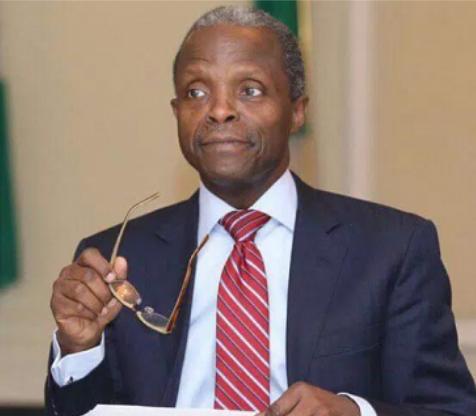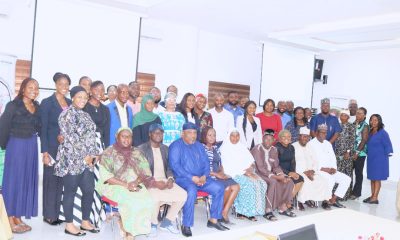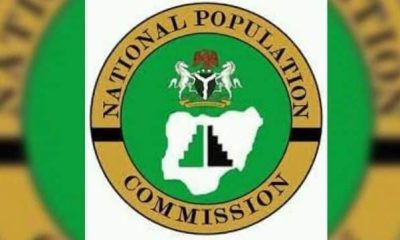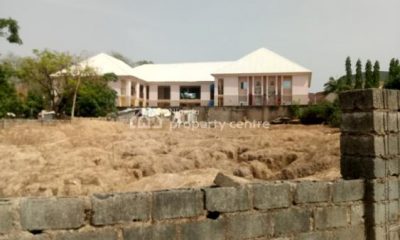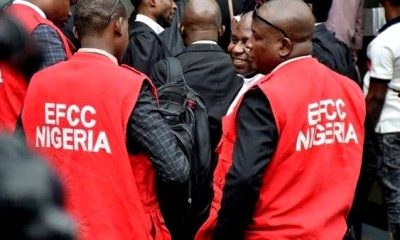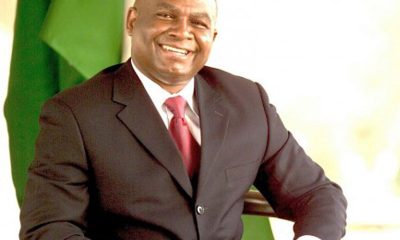Economy
AfCFTA, Unique Opportunity to Consolidate Africa’s Large Market – Osinbajo
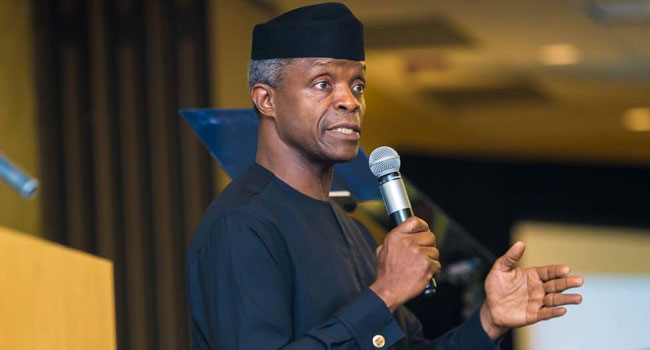
Vice-President Yemi Osinbajo says the African Continental Free Trade Area (AfCFTA) is a unique opportunity to consolidate Africa’s large market, which will address the economic challenges of the continent.
Osinbajo made the assertion at a hybrid International Conference on Africa’s Economy at Newark, New Jersey, with the theme, “African’s Economy: The way Forward,’’ organised by Global Patriot Newspapers.
Osinbajo, who spoke virtually through his spokesman, Laolu Akande.
said AfCFTA would create and recover millions of jobs, reduce Africa’s import dependency, boost intra-Africa trade and exports; and strengthen intra-Africa cross-border ties and trade relations.“For instance, with the agricultural sector accounting for about 23 per cent of the continent’s Gross Domestic Product (GDP), the sector is regarded as the key to the overall productivity of the African economy.
“This is why we must improve our agricultural productivity; we must produce our own food and reduce import dependency for key commodities.
“We must also adopt policy actions to create an environment in which businesses can thrive, starting with the adoption of the right type of macroeconomic and industrial policies,’’ he said.
The Vice-President, who spoke on the theme of the conference, insisted that AfCFTA was the way forward for the African Economy, based on its objective to create a single market for the economic integration of the African Continent.
“With a population of about 1.3 billion people, by leveraging the many opportunities provided by AfCFTA, we can provide more jobs for our teeming youth population.
“We can create the Africa we want by significantly boosting intra-Africa trade, in particular, trade in value-added production and trade across all sectors of Africa’s economy.
“We can truly then transform our continent into a global powerhouse,’’ he said.
According to him, Africa is the last frontier for economic development, and it has the potential to be a global growth pole and AfCFTA is the leverage to benefit our individual countries and the whole Continent.
The vice-president said with an estimation of potential income gains in Africa of up to $450 billion dollars by 2035, it could be a game changer for African economies.
“This means a whole lot for different sectors of our economies. Africa must unlock its great potential in different sectors.
“Already our young people are showing us that it can be done.
“Between 2016 and now, and in the middle of two recessions, Nigeria now has at least six unicorns – that is tech companies with a valuation of over $1 billion dollars.
“It does show you how much energy and how much traction the whole technology space is gaining. This energy can be replicated across the board in every area of our economy through the AfCFTA,’’ he said.
He, however, said the challenge of rebuilding our economies was a task that we must undertake with an urgent sense of purpose.
“The AfCFTA is expected to bring about a number of benefits to producers, consumers and countries alike.
“The hope is that African producers would benefit from access to cheaper inputs and intermediate goods as well as larger markets for their products while consumers have access to cheaper goods and a broader variety of products.
“And we need to be proactive to reap the great benefits of participating effectively in the AfCFTA.
“African economies can experience gains from trade and further benefit from removing the onerous requirements of belonging to multiple and overlapping trade agreements within the continent,’’ the vice-president said.
In addition, Osinbajo said going by the estimation of the UN- Economic Commission for Africa, with full liberalisation, intra-Africa trade was expected to increase by 52.3 per cent as compared to a baseline scenario without AfCFTA by 2022.
He said with such an increase, African economies individually as separate countries, and the continent as a whole, would benefit from the growth that often accompanied increased trade flows.
“Recently, at the end of September, Rwanda reportedly exported its first consignment of goods under the African Continental Free Trade Area (AfCFTA) agreement to Ghana on Friday, Sept. 30.
“The first consignment of coffee from Igire Coffee Limited was flown to Accra, marking the formal start of preferential trading under the AfCFTA agreement.
“It is just a glimpse of the limitless opportunities for the industrialisation of Africa that is possible and for which AfCFTA can be the vehicle.
“So, governments across the continent must take the right policy actions to actualize them. Such actions include the protection of local industries and improving value chains,’’ Osinbajo said.
According to him, an important objective of the AfCFTA is to overcome the economic fragmentation of the continent by bringing the regional economic blocs together in a common arrangement.
“This being the case, African countries should look to negotiating trade treaties with other parts of the world on the basis of AfCFTA rather than through arbitrarily designed regional blocs.
“African countries should not allow themselves to be lured into arrangements which do not serve their long-term and overall development objectives,” he said.
The News Agency of Nigeria (NAN) reports that the conference had in attendance dignitaries, including the Permanent Representative of Nigeria to the United Nations, Amb. Tijjani Muhammed-Bande and Consul General of Nigeria in New York, Amb. Lot Egopija.
Also, the President of Ijaw Diaspora Congress (IDC), Prof. Mondy Gold (who Chaired the event), and Deputy Consul General of Egypt in New York, Mr Mohammed Elhalawani.
Other key speakers at the conference included the Chairman of Stanbic IBTC Bank PLC , Mrs Sola David-Borha and Rev. Monsignor (Dr) Anselm Nwaorgu of the Catholic Church in New Jersey.
Prof. Akil Khalfani, the Director, Africana Center of the Essex County College, Newark, New Jersey and Dr Abubakar Sokoto Mohammad of the Usman Danfodio University (UDU), Sokoto., among others, spoke at the event. (NAN)
Economy
We’ll Continue Borrowing Within Sustainable Limits- FG

The Federal Government says it will continue to borrow within manageable and sustainable limits in accordance with the Debt Management Office (DMO) debt sustainability framework.
This is contained in a statement by the Director, Information and Public Relations in the Ministry of Finance, Mr Mohammed Manga, in Abuja on Wednesday.
President Bola Tinubu recently requested the approval of the 2024 – 2026 external borrowing rolling plan from the National Assembly.
Tinubu has requested the National Assembly’s approval to secure external loans of 21.5 million dollars and 15 billion Yuan, along with a grant of 65 million Euro, as part of the federal government’s proposed 2025–2026 external borrowing plan.
Manga said that the proposed borrowing plan was an essential component of the Medium-Term Expenditure Framework (MTEF) in accordance with both the Fiscal Responsibility Act 2007 and the DMO Act 2003.
“The plan outlines the external borrowing framework for both the federal and sub-national governments over a three-year period, accompanied by five detailed appendices on the projects, terms and conditions, implementation period, etc.
“By adopting a structured, forward-looking approach, the plan facilitates comprehensive financial planning and avoids the inefficiencies of ad-hoc or reactive borrowing practices.
“This strategic method enhances the country’s ability to implement effective fiscal policies and mobilise development resources,” he said.
According to the statement, the borrowing plan does not equate to actual borrowing for the period.
“The actual borrowing for each year is contained in the annual budget. In 2025, the external borrowing component is 1.23 billion dollars, and it has not yet been drawn.
“This is planned for H2 2025, the plan is for both federal and several state governments across numerous geopolitical zones including Abia, Bauchi, Borno, Gombe, Kaduna, Lagos, Niger, Oyo, Sokoto, and Yobe States.
“Importantly, it should be noted that the borrowing rolling plan does not equate to an automatic increase in the nation’s debt burden.
“The nature of the rolling plan means that borrowings are split over the period of the projects, for example, a large proportion of projects in the 2024–2026 rolling plan have multi-year drawdowns of between five to seven years which are project-tied loans,” Manga said.
He said that these projects cut across critical sectors of the economy, including power grids and transmission lines, irrigation for improving food security, fibre optics network across the country, fighter jets for security, rail and road infrastructure.
According to him, the majority of the proposed borrowing will be sourced from the country’s development partners, like the World Bank, African Development Bank, French Development Agency, European Investment Bank, JICA, China EximBank, and the Islamic Development Bank.
Manga said that these institutions offer concessional financing with favourable terms and long repayment periods, thereby supporting Nigeria’s development objectives sustainably.
He said that the government seeks to reiterate that the debt service to revenue ratio has started decreasing from its peak of over 90 per cent in 2023.
Manga said that the government has ended the distortionary and inflationary ways and means.
According to him, there is significant revenue expectations from the Nigerian National Petroleum Corporation Limited (NNPC Ltd), technology-enabled monitoring and collection of surpluses from government owned enterprises and revenue-generating ministries, departments, and agencies and legacy outstanding dues.
“Having achieved a fair degree of macroeconomic stabilisation, the overarching goal of the federal government is to pivot the economy onto a path of rapid, sustained, and inclusive economic growth.
“Achieving this vision requires substantial investment in critical sectors such as transportation, energy, infrastructure, and agriculture.
“These investments will lay the groundwork for long-term economic diversification and encourage private sector participation.
“Our debt strategy is therefore guided not solely by the size of our obligations, but by the utility, sustainability, and economic returns of the borrowing,” he said.(NAN)
The Federal Government says it will continue to borrow within manageable and sustainable limits in accordance with the Debt Management Office (DMO) debt sustainability framework.
This is contained in a statement by the Director, Information and Public Relations in the Ministry of Finance, Mr Mohammed Manga, in Abuja on Wednesday.
President Bola Tinubu recently requested the approval of the 2024 – 2026 external borrowing rolling plan from the National Assembly.
Tinubu has requested the National Assembly’s approval to secure external loans of 21.5 million dollars and 15 billion Yuan, along with a grant of 65 million Euro, as part of the federal government’s proposed 2025–2026 external borrowing plan.
Manga said that the proposed borrowing plan was an essential component of the Medium-Term Expenditure Framework (MTEF) in accordance with both the Fiscal Responsibility Act 2007 and the DMO Act 2003.
“The plan outlines the external borrowing framework for both the federal and sub-national governments over a three-year period, accompanied by five detailed appendices on the projects, terms and conditions, implementation period, etc.
“By adopting a structured, forward-looking approach, the plan facilitates comprehensive financial planning and avoids the inefficiencies of ad-hoc or reactive borrowing practices.
“This strategic method enhances the country’s ability to implement effective fiscal policies and mobilise development resources,” he said.
According to the statement, the borrowing plan does not equate to actual borrowing for the period.
“The actual borrowing for each year is contained in the annual budget. In 2025, the external borrowing component is 1.23 billion dollars, and it has not yet been drawn.
“This is planned for H2 2025, the plan is for both federal and several state governments across numerous geopolitical zones including Abia, Bauchi, Borno, Gombe, Kaduna, Lagos, Niger, Oyo, Sokoto, and Yobe States.
“Importantly, it should be noted that the borrowing rolling plan does not equate to an automatic increase in the nation’s debt burden.
“The nature of the rolling plan means that borrowings are split over the period of the projects, for example, a large proportion of projects in the 2024–2026 rolling plan have multi-year drawdowns of between five to seven years which are project-tied loans,” Manga said.
He said that these projects cut across critical sectors of the economy, including power grids and transmission lines, irrigation for improving food security, fibre optics network across the country, fighter jets for security, rail and road infrastructure.
According to him, the majority of the proposed borrowing will be sourced from the country’s development partners, like the World Bank, African Development Bank, French Development Agency, European Investment Bank, JICA, China EximBank, and the Islamic Development Bank.
Manga said that these institutions offer concessional financing with favourable terms and long repayment periods, thereby supporting Nigeria’s development objectives sustainably.
He said that the government seeks to reiterate that the debt service to revenue ratio has started decreasing from its peak of over 90 per cent in 2023.
Manga said that the government has ended the distortionary and inflationary ways and means.
According to him, there is significant revenue expectations from the Nigerian National Petroleum Corporation Limited (NNPC Ltd), technology-enabled monitoring and collection of surpluses from government owned enterprises and revenue-generating ministries, departments, and agencies and legacy outstanding dues.
“Having achieved a fair degree of macroeconomic stabilisation, the overarching goal of the federal government is to pivot the economy onto a path of rapid, sustained, and inclusive economic growth.
“Achieving this vision requires substantial investment in critical sectors such as transportation, energy, infrastructure, and agriculture.
“These investments will lay the groundwork for long-term economic diversification and encourage private sector participation.
“Our debt strategy is therefore guided not solely by the size of our obligations, but by the utility, sustainability, and economic returns of the borrowing,” he said.(NAN)
Economy
Organise Informal Sector, Tax Prosperity Not Poverty, Adedeji Tasks Officials

The Chairman, Joint Tax Board (JTB), Dr Zacch Adedeji, has urged officials of the board to organise traders and artisans into a formal body before capturing them in the tax net.
Adedeji said that this was in line with the agenda of President Bola Tinubu not to tax poverty but prosperity.
The chairman stated this at the 157th Joint Tax Board meeting held in Ibadan, on Monday.
The theme of the meeting “Taxation of the Informal Sector: Potentials and Challenges”.
Speaking on the theme of the event, Adedeji stressed the need to evolve a system that would make the informal sector formal before it could be taxed.
Adedeji, who also doubles as the Chairman, Federal Inland Revenue Service, (FIRS), said “What I would not expect from the JTB meeting is to define a system that would tax the informal sector.
“The only thing is to formalize the informal sector, not to design a system on how to collect tax from market men and women.
“As revenue administrator, our goal is to organise the informal sector so that it can fit into existing tax law.”
Citing a report of the National Bureau of Statistics (NBS) in the first quarter of 2023, the chairman said that the nation’s unemployment index was attributable to recognised informal work.
Adedeji stated that workers in that sector accounted for 92.6 per cent of the employed population in the country as at Q1 2023.
“JTB IS transiting to the Joint Revenue Board with expanded scope and functions.
“We are hopeful that by the time we hold the next meeting of the Board, the Joint Revenue Board (Establishment) Bill would have been signed into Law by the President.
“The meetings of the board provide the platform for members to engage and brainstorm on contemporary and emerging issues on tax, and taxation,” he said.
In his address, Gov. Seyi Makinde of Oyo State, said the theme of the meeting was apt and timely, stressing that it coincides with the agenda of the state to improve on its internally generated revenue.
According to him, the meeting should find the best way forward in addressing the issue of the informal sector and balance the identified challenges.
“Nigeria is rich in natural resources, but it is a poor country because economic prosperity does not base on natural resources,”
Makinde also said that knowledge, skill and intensive production were required for economic prosperity, not just the availability of natural resources.
He stressed the need to move from expecting Federal Allocations to generating income internally.
“We are actively ensuring that people are productive and moving the revenue base forward,” Makinde said.
The governor said that tax drive should be done by simplifying tax processes, incentives for compliance like access to empowerment schemes and loans.
He urged JTB to deepen partnership and innovation in using data on tax to track and administer it.
Earlier, the Executive Chairman, Oyo State Board of Internal Revenue, Mr Olufemi Awakan, said the meeting was to address tax-related matters, evolve a workable, effective and
efficient tax system across the states and at the Federal level.
He urged participants to find amicable solutions to challenges of tax jurisdiction, among others.
Tax administrators from all the 36 states of the federation, who are members of JTB, were in attendance. (NAN)
Economy
Customs Zone D Seizes Contraband Worth N110m

The Nigeria Customs Service (NCS), Federal Operation Unit (FOU), Zone D, has seized smuggled goods worth over N110 million between April 20 till date.
The Comptroller of Customs, Abubakar Umar, said this at a news conference on Tuesday in Bauchi.
He listed the seized items to include 11,200 litres of petrol; 192 bales of second hand clothing, 140 cartons of pasta, 125 pairs of jungle boots, 47 bags of foreign parboiled rice and 9.
40 kilogramme of pangolin scales.Umar said the items were seized through increased patrols, intelligence-led operations, and strengthened inter-agency collaboration.
The comptroller said the pangolin scales would be handed over to the National Environmental Standards and Regulations Enforcement Agency (NESREA) for appropriate action, while the seized petrol would be auctioned, and the proceeds remitted to the federation account.
He attributed the decrease in smuggling activities of wildlife, narcotics, and fuel to the dedication and professionalism displayed by the personnel in line with Sections 226 and 245 of the NCS Act 2023.
The comptroller enjoined traders to remain law abiding, adding the service would scale up sensitisation activities to combat smuggling.
“We remain resolute in securing the borders and contributing to Nigeria’s economic development,” he said.
The FOU Zone D comprises Adamawa; Taraba, Bauchi, Gombe, Borno, Yobe, Plateau, Benue and Nasarawa. (NAN)








